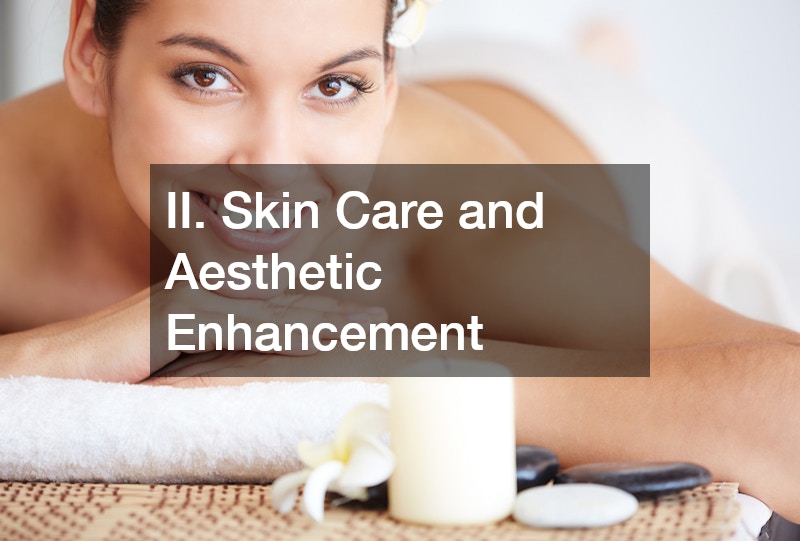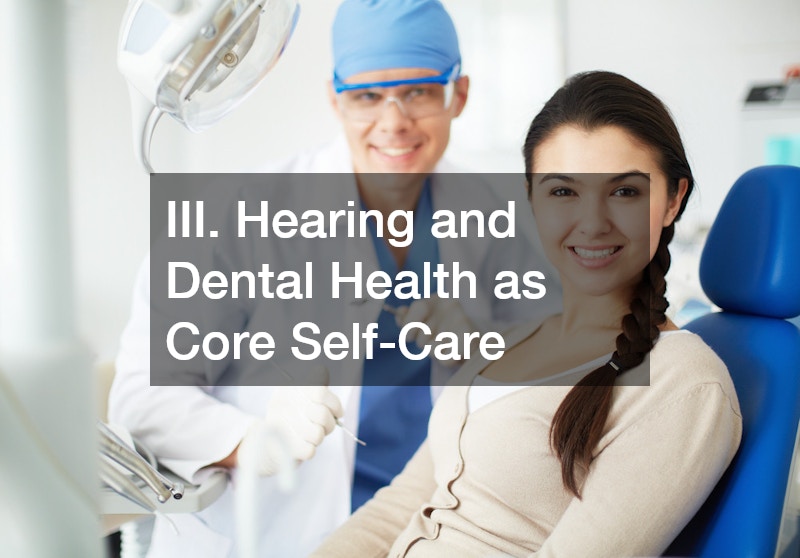
In today’s busy world, a comprehensive self-care routine can make a world of difference. Integrating medical support, skincare, and wellness practices not only enhances physical health but also fosters mental well-being, giving us a foundation for better productivity, confidence, and longevity. Rather than addressing each area individually, combining medical, skin care, and wellness support allows us to target every aspect of our health holistically. This guide explores how to create a balanced routine that promotes optimal well-being, covering everything from medical checkups to advanced skincare treatments and stress-reducing wellness practices.
I. Medical Foundations for Self-Care
Building a strong foundation for self-care begins with prioritizing medical health. Regular checkups and consultations with primary care doctors provide essential insights into key health markers, helping to identify potential issues early. Specialized support, such as back pain treatment or hormonal assessments, addresses specific needs that impact daily well-being. Regular cognitive health checks are also valuable, especially for those with a family history of cognitive decline, as they promote mental resilience. By integrating medical attention into a self-care routine, we not only improve physical health but also ensure that our wellness practices align with personalized, medically guided insights.
A. Regular Health Checkups and Medical Consultations

Consistent medical checkups are the cornerstone of self-care. By visiting a primary care physician at least annually, we can catch and manage potential health issues before they escalate. Regular checkups help monitor key health indicators such as blood pressure, cholesterol levels, and blood sugar, which can often go unnoticed without professional evaluation.
When it comes to self-care, nothing is more critical than knowing your health baseline. Doctors can provide guidance on lifestyle choices, recommend screenings based on age or family history, and help create preventive plans. This proactive approach, when integrated into a self-care routine, makes it easier to adapt wellness practices that align with personal health needs.
B. Specialized Health Support for Key Needs
For issues like chronic pain, hormonal imbalances, and physical health, specialized medical support can be invaluable. Back pain, for instance, is a common ailment that can significantly impact daily life. Seeking targeted treatments from specialists like chiropractors or physical therapists can help alleviate pain and prevent further strain.
Hormonal health also plays a crucial role in energy levels, mood stability, and metabolism. For men with low testosterone, consulting with an endocrinologist or urologist can open pathways to treatment that boost vitality and overall quality of life. Routine monitoring and treatment for hormonal imbalances are powerful tools in supporting a balanced, energetic life.
C. Memory and Cognitive Health Support
Memory health often takes a back seat in self-care discussions, yet it’s essential for long-term well-being. Cognitive assessments can benefit individuals, especially those with a family history of dementia or cognitive decline. Memory care programs, brain exercises, and cognitive therapy all work to maintain brain health, improve focus, and support memory retention.
Incorporating these measures into a self-care routine is not only preventive but also empowering, as it allows us to preserve our cognitive health and independence as we age.
II. Skin Care and Aesthetic Enhancement

Incorporating skin care and aesthetic enhancement into self-care boosts both appearance and confidence. A personalized skincare routine, including cleansing, exfoliating, and moisturizing, is essential for maintaining healthy, glowing skin. For deeper rejuvenation, in-office treatments like chemical peels, microneedling, and platelet-rich plasma or PRP therapy can significantly improve skin texture and elasticity, reducing signs of aging and enhancing radiance. Additionally, cosmetic procedures, from minimally invasive options like Botox to surgical solutions from trusted plastic surgeons, provide tailored enhancements for individuals seeking lasting results. These options empower people to address skin concerns proactively, creating a holistic self-care approach that promotes both health and aesthetic satisfaction.
A. Building a Personalized Skin Care Routine
Skin care is a vital aspect of self-care, enhancing both health and confidence. A basic routine of cleansing, exfoliating, moisturizing, and protecting from UV rays forms a strong foundation. Tailoring products to individual skin types—dry, oily, sensitive, or combination—can help prevent irritation and achieve optimal results.
For persistent issues like acne, dryness, or discoloration, dermatologists can recommend advanced solutions, such as topical treatments or prescription-based regimens. Personalized skin care not only nourishes the skin but also protects against environmental stressors, keeping skin resilient over time.
B. Advanced Skin Treatments for Optimal Results
For those looking to take their skincare routine further, in-office treatments offer a range of benefits. Chemical peels, microneedling, and light therapies work on a deeper level to renew skin texture, reduce signs of aging, and stimulate collagen production.
A popular choice, PRP (platelet-rich plasma) therapy, involves using one’s own plasma to promote skin rejuvenation. Known for stimulating collagen and improving skin elasticity, PRP is a non-surgical option that offers significant results with minimal downtime, making it ideal for those with busy lifestyles.
C. Surgical and Non-Surgical Aesthetic Options
In addition to skincare, many individuals seek aesthetic procedures to enhance their appearance and boost confidence. Plastic surgery options like facelifts or body contouring provide more permanent changes, while non-invasive treatments, such as Botox or fillers, offer subtler results without extensive recovery time. These options can be personalized to fit both aesthetic goals and practical needs, helping individuals look and feel their best.
III. Hearing and Dental Health as Core Self-Care

Hearing and dental health are essential yet often overlooked components of self-care that significantly impact our quality of life. Regular hearing assessments help prevent isolation and cognitive decline, especially for those exposed to high noise levels or with a family history of hearing loss. Audiologists can provide hearing aids or protective solutions tailored to individual needs, maintaining strong communication abilities. Similarly, good dental care is crucial not only for a bright smile but also for overall health. Regular checkups prevent gum disease and decay, and even cosmetic options boost confidence, supporting both physical and mental well-being in our daily lives.
A. Prioritizing Hearing Health
Hearing is often overlooked in self-care, but regular hearing assessments are crucial, particularly for those exposed to loud environments or with genetic predispositions to hearing loss. Hearing loss, if undetected, can significantly impact communication, safety, and even mental health.
Audiologists provide testing and solutions such as hearing aids and custom ear protection. Protecting hearing health is a proactive measure that can prevent isolation and enhance quality of life, supporting our ability to stay engaged with family, friends, and the world around us.
B. Dental Care and Its Impact on Well-being
Dental health impacts much more than just our smile. Regular cleanings and checkups prevent decay, gum disease, and other issues that can affect overall health. Poor dental hygiene has even been linked to conditions like heart disease and diabetes.
Cosmetic dental options, such as whitening, veneers, or clear aligners, offer aesthetic improvements that boost confidence. Maintaining oral health is integral to self-care as it enhances our appearance and protects our long-term well-being.
IV. Integrating Wellness Practices for Physical and Mental Balance
Integrating wellness practices into your self-care routine is essential for achieving physical and mental balance. Regular activities like massage therapy provide relaxation and pain relief, reducing stress and promoting circulation. Incorporating mental health practices—such as mindfulness, meditation, or counseling—helps manage stress and enhance emotional resilience. Physical fitness, whether through high-intensity workouts, yoga, or Pilates, strengthens the body, boosts energy levels, and improves mental clarity. Together, these practices create a holistic approach to wellness, addressing both body and mind. By making these wellness habits part of daily life, you support long-term health and well-being in every aspect of life.
A. Benefits of Massage Therapy for Stress Relief and Recovery
Massage therapy is a powerful tool for physical and mental relief. It eases muscle tension, improves blood flow, and helps the body recover from physical exertion. Different types of massages, from Swedish to sports, address various needs and can be tailored to individual preferences.
Regular massage sessions relieve stress, which benefits mental clarity and emotional well-being. Massage therapy is also a restorative practice that aligns perfectly with a holistic approach to self-care.
B. Mental Health and Stress Management
Mental health is foundational to self-care. Incorporating practices like mindfulness and meditation helps us cope with stress and develop resilience. Counseling or therapy sessions provide a safe space to address mental health issues and equip us with tools for emotional regulation.
Mental health support not only improves our inner well-being but also enhances our ability to engage fully in work, relationships, and other aspects of life.
C. Fitness and Physical Activity as a Core Wellness Component
Physical fitness is another pillar of self-care, improving cardiovascular health, muscle strength, and mental clarity. Tailoring exercise routines to individual goals—whether that’s strength, endurance, or flexibility—makes fitness both accessible and enjoyable.
Incorporating low-impact options like yoga or Pilates can be ideal for those seeking gentle, restorative exercise. Whatever the choice, physical activity enhances vitality and reduces the risk of chronic illness, making it a vital part of a well-rounded self-care routine.
V. Enhancing Energy and Vitality Through Lifestyle Choices

A well-rounded self-care routine includes lifestyle choices that boost energy and vitality. Nutrition is key—focusing on nutrient-dense foods like fruits, vegetables, lean proteins, and whole grains supports sustained energy and optimal health. Staying hydrated is equally important, aiding in cognitive clarity and physical performance. Quality sleep is another crucial element, as it allows the body and mind to recover, supporting better mood and mental function. Incorporating vitamins and natural supplements, such as omega-3s, vitamin D, or turmeric, can further enhance wellness. Together, these lifestyle habits fuel us with the stamina and resilience needed for a fulfilling, active life.
A. Nutrition and Hydration for Sustained Health
A balanced diet is the foundation of physical health. Prioritizing nutrient-dense foods like vegetables, lean proteins, and whole grains supports bodily functions and boosts energy levels. Staying hydrated further promotes skin health, cognitive function, and physical performance.
Making conscious dietary choices enriches every aspect of life, helping us stay energized, focused, and resilient against illness.
B. Quality Sleep for Recovery and Mental Clarity
Sleep is essential for recovery and mental well-being. Poor sleep can impact mood, cognitive function, and physical health. To improve sleep quality, establish a routine, limit screen time before bed, and create a calm environment conducive to rest.
Prioritizing sleep is a powerful way to enhance overall wellness and ensure the mind and body function at their best.
C. Vitamins, Supplements, and Natural Boosters

When dietary needs aren’t fully met, supplements offer a valuable addition. Vitamins, minerals, and herbal boosters can address specific deficiencies, such as vitamin D for bone health or omega-3s for heart support. Superfoods like turmeric, green tea, or collagen provide additional benefits.
Before introducing new supplements, consulting with a healthcare provider is advisable to ensure safety and compatibility with existing health needs.
VI. Creating a Customized Self-Care Plan
Creating a customized self-care plan starts with assessing your unique needs and goals. Begin by identifying the areas that need attention, whether it’s physical health, skin care, stress management, or mental well-being. Setting clear, achievable goals allows you to prioritize your efforts and make gradual progress. Regular check-ins with medical professionals, such as doctors or specialists, ensure your plan remains effective and aligned with your health needs. Stay flexible—self-care is a dynamic process, and adjustments may be necessary as your lifestyle, goals, and needs evolve over time. A personalized approach leads to sustainable, long-term well-being.
A. Setting Goals and Prioritizing Needs
Building a self-care plan starts with setting personal goals. Identifying primary needs, whether they’re improved skin, reduced stress, or better physical health, helps focus efforts. By establishing small, achievable steps and tracking progress, self-care becomes more manageable and effective.
B. Scheduling Regular Check-Ins with Professionals
A personalized self-care plan benefits from regular consultations with healthcare providers, from general practitioners to specialists like audiologists and dentists. This team of professionals offers tailored insights based on health history, ensuring a well-rounded approach to self-care.
C. Staying Flexible and Adjusting as Needs Evolve
Self-care is a dynamic process. As life evolves, so do our needs and priorities. Regularly revisiting self-care goals and adjusting routines based on current health and lifestyle keeps self-care fresh, relevant, and effective.
Conclusion
A holistic self-care routine integrates medical, skincare, and wellness practices to support our health, appearance, and mental well-being. By taking proactive steps, investing in quality healthcare, and staying committed to wellness, we create a balanced life where we look and feel our best. Self-care is more than a trend; it’s an investment in lifelong well-being, empowering us to enjoy a more vibrant, fulfilling life.
